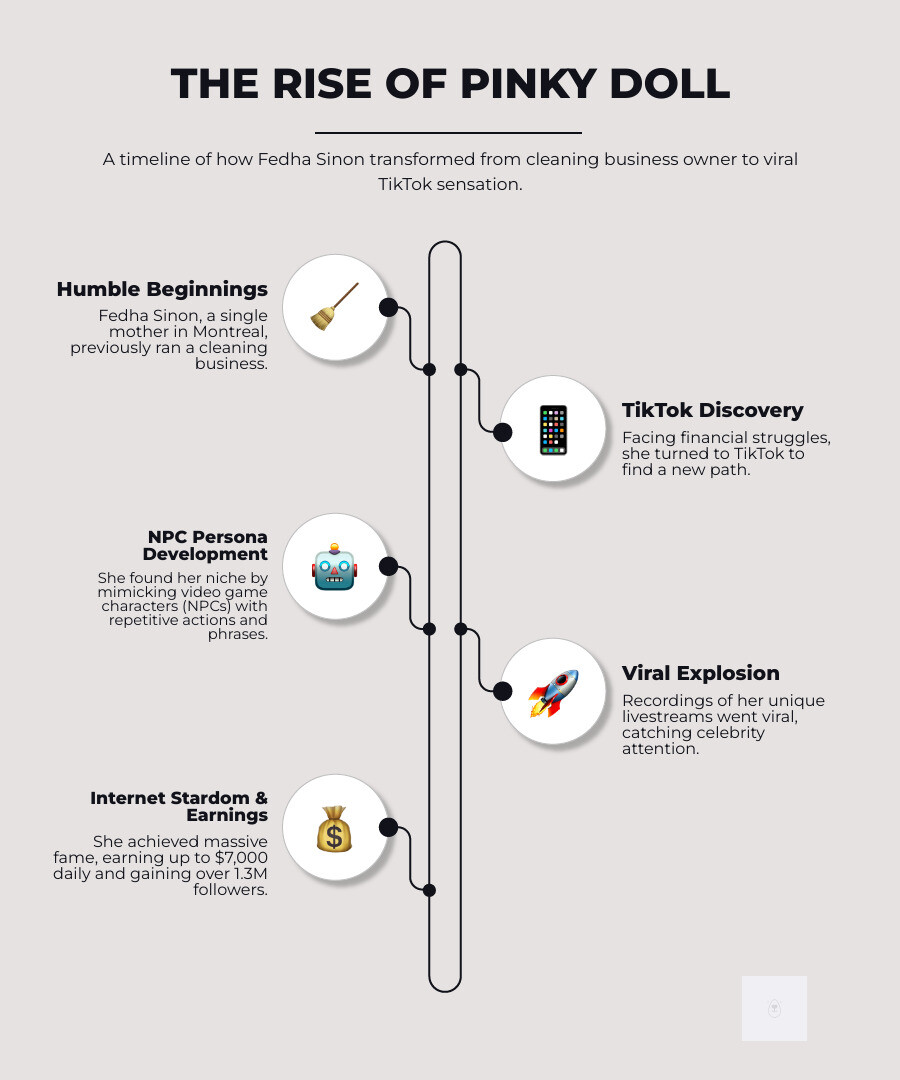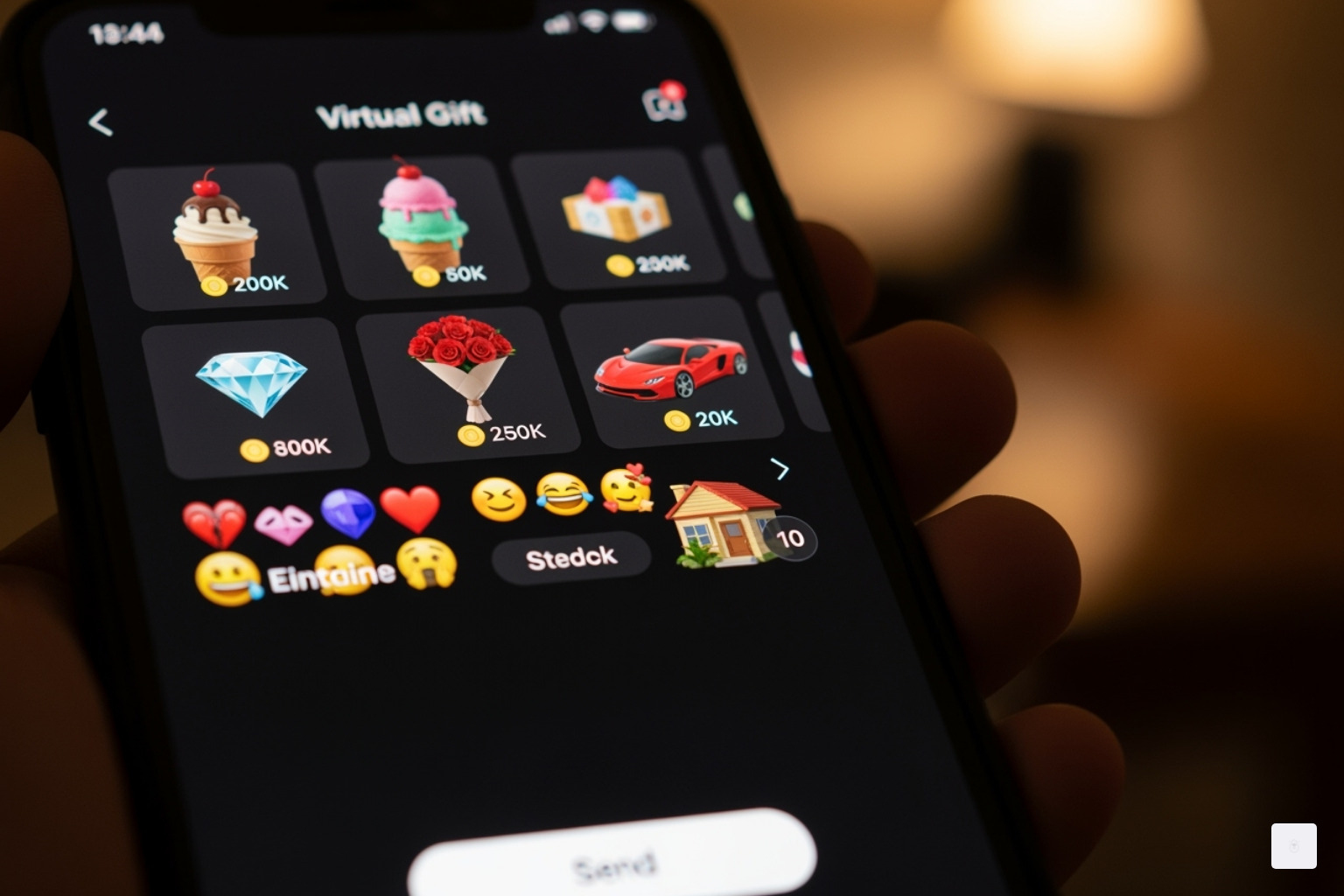
Understanding the Internet’s Most Fascinating Viral Sensation
Pinky doll refers to Fedha Sinon, a Canadian TikTok streamer who became a viral internet sensation in 2023 for her “NPC streaming” performances where she mimics video game characters with repetitive phrases and robotic movements.
Key Facts about Pinky Doll:
- Real Name: Fedha Sinon, 27-year-old from Montreal, Canada
- Famous For: NPC (Non-Player Character) streaming on TikTok
- Signature Phrases: “Ice cream so good” and “gang gang”
- Earnings: Reports claim $2,000-$7,000 per day from livestreams
- Followers: Over 1.3 million on TikTok as of 2023
- Background: Former stripper and cleaning business owner, single mother
The phenomenon exploded when recordings of her unusual livestream performances went viral on Twitter, catching the attention of celebrities like Timbaland and Elon Musk. Her repetitive, mechanical reactions to viewer gifts – like saying “Ice cream so good” when someone sends a virtual ice cream cone – have sparked debates about internet culture, monetization, and the psychology of viral content.
What makes this story particularly fascinating for New York’s cultural elite is how it represents a complete shift in entertainment and celebrity. Here’s someone who transformed from running a cleaning business in Montreal to earning thousands daily by acting like a video game character – all while major media outlets try to decode her appeal.
As R. Couri Hay, we’ve spent decades observing how fame and cultural phenomena evolve, and the pinky doll sensation represents something entirely new in our digital age. This viral trend perfectly captures how modern celebrity can emerge from the most unexpected corners of the internet, creating new forms of performance art that blur the lines between entertainment, psychology, and commerce.

Must-know pinky doll terms:
Who is Pinky Doll? The Face Behind the Viral Sensation

Credit : Christopher Polk/Penske Media/Getty
Behind the robotic phrases and viral pinky doll phenomenon is Fedha Sinon, a 27-year-old single mother from Montreal whose journey to internet stardom is far more compelling than her repetitive catchphrases might suggest.
For a deeper dive into her breakout and the mechanics of her appeal, see The New York Times feature: “How PinkyDoll Mesmerized the Internet”. Coverage like this resonated especially with readers in New York City, where cultural trends and digital fame intersect daily.
Fedha’s story resonates with anyone who’s ever faced unexpected setbacks and had to reinvent themselves. Her path to becoming TikTok’s most famous NPC wasn’t planned – it emerged from necessity, creativity, and a mother’s determination to provide for her child.
What makes her story particularly fascinating for those of us observing cultural trends from New York City is how authentically relatable her motivations are, despite the surreal nature of her performances. This isn’t just another internet oddity—it’s a masterclass in digital entrepreneurship born from real-world struggles, with a genuine depth behind the digital spectacle.
From Cleaning Business to Digital Stardom
Fedha’s change began with loss. After traveling to the Seychelles for her stepfather’s funeral, she returned to Montreal to find her cleaning business had collapsed. Suddenly, this entrepreneur found herself searching for new ways to support her family.
Like many facing financial uncertainty, she turned to social media. Her early TikTok content was experimental – she was simply trying to find her voice in the crowded digital landscape. But then something unexpected happened: viewers began commenting that she reminded them of video game characters.
Instead of dismissing these comparisons, Fedha acceptd them completely. She studied non-player characters in games like Grand Theft Auto, observing their repetitive movements and responses. What started as viewer observations became her signature style, changing a casual comment into a lucrative niche.
This pivot from traditional business owner to digital performer showcases the unpredictable opportunities that exist in our connected world. Her willingness to lean into something unconventional – rather than fight against it – became her greatest asset.
The Person Behind the Persona
When the cameras stop rolling, Fedha returns to her life in Montreal, where French is her first language and her primary focus is raising her son. Her motivation is beautifully simple: she wants to provide the financial security she didn’t have growing up.
The dedication behind her pinky doll persona is remarkable. She spends approximately six hours daily creating content, going live two to three times per day. This isn’t casual content creation – it’s a full-time commitment driven by maternal love and entrepreneurial spirit.
Her childhood experiences with financial struggles fuel her work ethic. Every “ice cream so good” and “gang gang” represents her determination to ensure her son never faces the same uncertainties she did. This personal motivation transforms what might seem like meaningless repetition into purposeful performance art.
What strikes observers in New York’s cultural scene is how Fedha has turned vulnerability into strength. She’s open about her previous work as a stripper and webcam model, demonstrating comfort with performance and audience engagement that serves her well in livestreaming. Her diverse professional background – from cleaning services to digital content – reflects the modern reality of building multiple income streams.
Her success proves that authenticity, even wrapped in an artificial persona, resonates with audiences seeking genuine connection in an increasingly digital world.
Decoding the NPC Streaming Phenomenon
To understand the pinky doll phenomenon, we need to dive into the strange world of NPC streaming. NPC stands for “Non-Player Character” – those background figures in video games who repeat the same actions and phrases over and over. Think of the shopkeeper who always says “Welcome to my store!” or the guard who walks the same patrol route endlessly.
Now imagine real people mimicking these robotic characters during live streams. That’s exactly what NPC streaming is, and it’s captivating audiences in ways nobody expected.
The appeal is surprisingly complex. There’s something oddly mesmerizing about watching someone perform repetitive actions with mechanical precision. It taps into that “uncanny valley” feeling – when something looks almost human but not quite, creating an eerie fascination that’s hard to look away from.
Viewer psychology plays a huge role here. Some people find the repetitive nature genuinely relaxing, like a digital version of ASMR. Others are drawn to the sheer absurdity of it all. But perhaps most importantly, viewers get a sense of control – they can literally make the streamer perform specific actions by sending virtual gifts.
Even here in New York City, where we’ve seen every kind of performance art imaginable, this trend has people talking. It represents something entirely new in entertainment – a hybrid of gaming culture, performance art, and direct audience interaction that’s reshaping how we think about celebrity and content creation.
For brands and creators trying to understand this evolving landscape, it’s crucial to recognize how quickly these digital phenomena can emerge and capture global attention. That’s why we offer more info about our social media services to help steer these constantly shifting trends.
How NPC Streaming Works

The mechanics behind NPC streaming are brilliantly simple. Viewers purchase virtual gifts from TikTok – think digital stickers or emojis – and each gift triggers a specific response from the streamer. It’s like having a human jukebox that responds to your selections. For a clear mainstream explainer of the trend, see The Washington Post’s piece, “Why TikTokers are pretending to be robots”.
When someone sends Pinkydoll a virtual ice cream cone, she immediately responds with her signature “Ice cream so good” in that distinctive robotic tone. Send her a “GG” gift, and you’ll hear her famous “gang gang” catchphrase. Other gifts might trigger her to make slurping sounds or shout “Fire! Fire! Fire!”
What makes her streams particularly entertaining is the unexpected elements she weaves in. Pinkydoll often streams while popping corn with a hair straightener – a bizarre detail that adds to the surreal, almost performance-art quality of her content. This mix of predictable responses and quirky surprises keeps viewers engaged and, more importantly, keeps them sending those paid gifts.
The whole system converts these virtual gifts into TikTok diamonds, which streamers can then cash out as real money. It’s a direct line from viewer entertainment to creator income, with no middleman except the platform itself.
The Financials of a Viral Streamer
The money behind pinky doll’s success is staggering and shows just how lucrative viral content can be in today’s digital economy. Her earnings reveal the incredible potential of this new form of entertainment.
Pinkydoll’s reported daily earnings range from $2,000 to $3,000 per individual stream, but during her peak viral period in July 2023, she was pulling in as much as $7,000 in a single day. That’s more than many people make in a month, earned by saying “ice cream so good” and popping corn with a hair straightener.
Her income streams extend beyond just TikTok. She estimates earning around $7,000 daily across all her social media platforms, including OnlyFans and other brand partnerships. The beauty of this model is its direct nature – fans pay small amounts (some gifts cost less than two cents) but the volume adds up incredibly quickly.
Of course, TikTok takes its cut – reportedly around half of all virtual gift revenue. But even after the platform’s share, the sheer volume of gifts from her rapidly growing audience (she jumped from 400,000 to over one million followers in just one month) translates into life-changing income.
This monetization model represents a fundamental shift in how creators can earn money. Instead of relying on brand deals or ad revenue, streamers like Pinkydoll have direct access to their audience’s wallets through micro-transactions. It’s immediate, scalable, and completely dependent on audience engagement – a perfect storm for viral success.
The financial implications extend far beyond individual creators. This trend is showing traditional media and entertainment industries that audiences are willing to pay directly for content that entertains them, no matter how unconventional it might seem.
The Cultural Impact and Controversies of the Pinky Doll Persona

What started as quirky TikTok streams quickly became a cultural moment that rippled far beyond social media. The pinky doll phenomenon caught the attention of some truly unexpected fans, creating a fascinating collision between viral internet culture and mainstream celebrity.
Timbaland, the legendary music producer, became one of her most notable supporters. He didn’t just watch from the sidelines – he actively participated, sending expensive virtual gifts during her livestreams and even reacting to her content on his own social media. When someone of Timbaland’s stature in the music industry takes notice, it signals something significant is happening.
Elon Musk also weighed in on the phenomenon, adding his voice to the growing conversation around NPC streaming. Having figures from both the entertainment and tech worlds acknowledge her work helped cement Pinkydoll’s status as more than just a fleeting internet trend.
Her signature phrases became part of the broader internet vocabulary. “Ice cream so good” and “gang gang” started appearing in memes, reaction videos, and even casual conversations across social media platforms. In New York City’s always-evolving cultural landscape, her catchphrases became as recognizable as any traditional celebrity quote.
However, this rapid rise brought uncomfortable questions about the nature of her content. Critics began debating whether her streams constituted fetish content, pointing to what they described as a blend of sexuality and robotic behavior that appealed to specific viewer interests. While Pinkydoll herself seemed unbothered by these discussions, attributing reactions to her appearance rather than intent, it highlighted ongoing debates about how women’s online content gets interpreted and categorized. These complex public perception challenges are exactly the type of situations where our crisis management PR services become essential for public figures navigating digital fame.
The Backlash and Criticisms Facing Pinky Doll
Fame at this level inevitably brings scrutiny, and Pinkydoll faced several significant controversies that tested her public image. The most serious backlash came during the 2023 Hollywood strikes, when writers and actors were fighting for better working conditions. Pinkydoll announced she had landed a “Hollywood job” during this sensitive period, leading to harsh criticism from supporters of the striking workers.
Many accused her of being a “scab” – someone who crosses picket lines to work during labor disputes. The timing couldn’t have been worse, and the reaction was swift and unforgiving. For someone who had built her fame on being likeable and entertaining, suddenly finding herself on the wrong side of a major labor movement was a jarring experience.
Another controversy emerged after her appearance at the Streamy Awards. Critics accused her of “light-skin fishing” – a term that refers to presenting oneself with a lighter skin tone or adopting aesthetics associated with lighter-skinned individuals. This sparked difficult conversations about race, authenticity, and representation in digital spaces.
Beyond these specific incidents, Pinkydoll faced the general criticism that comes with any unconventional form of entertainment. Some viewers found her performances “trying too hard” or described her speaking style as grating. Comments on platforms like Reddit ranged from calling her a “tryhard” to questioning whether she offered anything of real value. The harsh reality of internet fame is that the same audiences who lift you can just as quickly tear you down.
The Enduring Appeal of the Pinky Doll Character
Despite the controversies and criticism, there’s something undeniably compelling about the pinky doll persona that keeps audiences coming back. Part of it is her natural charisma – even critics often acknowledge her “star quality” and distinctive voice that many describe as smooth and engaging.
The appeal goes deeper than surface charm, though. Her performances exist in a strange space between human and machine, creating what psychologists call the “uncanny valley” effect. It’s simultaneously fascinating and slightly unsettling, which proves to be an irresistible combination for many viewers.
What makes her streams particularly engaging is the interactive element. Unlike traditional entertainment where audiences are passive consumers, her viewers become active participants. They literally control her actions through their gift purchases, creating a unique form of digital puppetry that blurs the lines between performer and audience.
Her occasional breaks in character add unexpected humanity to the robotic performance. When she addresses her son off-camera or interacts with her dog, viewers get glimpses of the real person behind the persona. These moments of authenticity make her more relatable and remind audiences that there’s a genuine person working hard to support her family.
The pinky doll phenomenon represents something entirely new in how celebrity and entertainment function in our digital age. Her success proves that modern fame can emerge from the most unexpected corners of the internet, turning confusion and curiosity into real financial success and cultural influence.
Frequently Asked Questions about Pinkydoll
How much money does Pinkydoll really make?
The financial success of pinky doll has captivated audiences almost as much as her robotic performances. Based on her own statements and extensive media coverage, Fedha Sinon’s earnings are quite impressive for someone who started with a cleaning business in Montreal.
During her peak popularity in summer 2023, she claimed to earn between $2,000 and $3,000 per individual stream. On her best days, particularly in July and August 2023, she reported making as much as $7,000 in a single day from her TikTok livestreams alone.
Her total daily income across all platforms tells an even more remarkable story. Combining her earnings from TikTok, OnlyFans, and various brand deals, she estimated her daily take at around $7,000 during her viral peak.
Of course, these figures represent gross income before expenses. TikTok takes approximately half of all virtual gift revenue, and she still needs to pay taxes and other business costs. Even so, these numbers demonstrate how lucrative viral content can be in our digital age – something we’ve observed closely here in New York City’s evolving media landscape.
Why do people watch NPC streaming?
The psychology behind NPC streaming fascination is surprisingly complex and varies dramatically among viewers. What might seem bizarre to traditional media consumers actually taps into several compelling human behaviors.
Many viewers describe a mesmerizing, almost hypnotic quality to the repetitive actions and phrases. The predictable nature of pinky doll’s responses creates an oddly soothing effect, similar to ASMR content that’s become popular across social media platforms.
There’s also a unique sense of control and interaction that draws people in. Unlike passive entertainment, viewers can directly influence the performance by sending virtual gifts. When someone sends an ice cream cone gift and immediately hears “ice cream so good,” they’ve created an instant cause-and-effect relationship with the performer.
The sheer novelty and confusion factor cannot be understated either. When we’re constantly bombarded with content, something genuinely unprecedented captures attention. Many viewers, particularly those in cultural hubs like New York City, are drawn to phenomena that challenge traditional entertainment boundaries.
Finally, there’s the fascinating “uncanny valley” effect – that slightly unsettling feeling when something appears almost, but not quite, human. This creates a compelling, if sometimes uncomfortable, viewing experience that keeps people coming back to understand what they’re witnessing.
What does “ice cream so good” mean?
“Ice cream so good” has become far more than just a catchphrase – it’s evolved into a cultural phenomenon that perfectly encapsulates the pinky doll experience.
The phrase serves a very specific function in her NPC streaming format. When viewers send a virtual ice cream cone gift during her TikTok livestreams, it triggers this robotic, repetitive response: “Ice cream so good. Mmm, ice cream so good.” The delivery is mechanical and predictable, mimicking how a video game character might respond to player actions.
What makes this phrase particularly fascinating is how it transcended its original context. Along with “gang gang” (triggered by “GG” gifts) and her dramatic “fire” reactions, these simple words became instant internet memes. They’ve appeared in content across social media platforms and even caught the attention of celebrities like Timbaland and Elon Musk.
The phrase perfectly represents the bizarre intersection of digital commerce, performance art, and viral culture that defines modern internet fame. It’s simultaneously meaningless and deeply significant – meaningless as individual words, but significant as a symbol of how quickly and unexpectedly new forms of entertainment can emerge and capture global attention.
For many observers, especially those following digital trends from cultural centers like New York City, “ice cream so good” represents something entirely new in how we think about celebrity, performance, and audience engagement in the digital age.
Conclusion
The pinky doll phenomenon represents something truly remarkable in our digital age – a complete change of what it means to be famous. Fedha Sinon’s incredible journey from running a cleaning business in Montreal to earning thousands of dollars daily by mimicking video game characters has fundamentally changed how we think about celebrity and success.
What makes this story so fascinating isn’t just the money or the viral fame. It’s how Fedha turned an unexpected comment from viewers – that she looked like a video game character – into a thriving digital empire. Her willingness to accept the bizarre, combined with her authentic motivation to provide for her son, created something genuinely new in entertainment.
From our perspective here in New York City, where we’ve witnessed countless cultural shifts and celebrity changes, the pinky doll story stands out as particularly significant. It shows how digital entrepreneurship can emerge from the most unlikely places, creating new forms of performance art that blur the lines between human interaction and technology.
The financial success alone is staggering – reportedly earning up to $7,000 per day through virtual gifts and audience engagement. But beyond the numbers, this phenomenon highlights how platforms like TikTok have democratized fame, allowing anyone with creativity and persistence to build a direct connection with audiences worldwide.
For those of us who study culture and society, the pinky doll trend offers valuable insights into modern entertainment. It demonstrates that authenticity, even when wrapped in surreal performance, resonates with audiences. Her repetitive phrases and robotic movements might seem simple, but they’ve created a new form of interactive entertainment that puts viewers in control.
As we look toward the future of digital media and celebrity culture, stories like Fedha’s remind us that innovation often comes from unexpected places. The most successful creators aren’t always those following traditional paths – sometimes they’re the ones brave enough to accept something completely different.
Understanding these evolving trends is crucial for anyone navigating today’s media landscape. Whether you’re building your own brand or managing public perception in this dynamic environment, recognizing how quickly and dramatically things can change is essential. For those looking to make their mark in this ever-shifting digital world, our More info about our publicity services can provide the strategic guidance needed to succeed.
The pinky doll phenomenon ultimately proves that in our connected world, creativity, authenticity, and the courage to be different can lead to extraordinary success. It’s a testament to the power of digital platforms to transform ordinary people into cultural icons, one virtual gift at a time.

